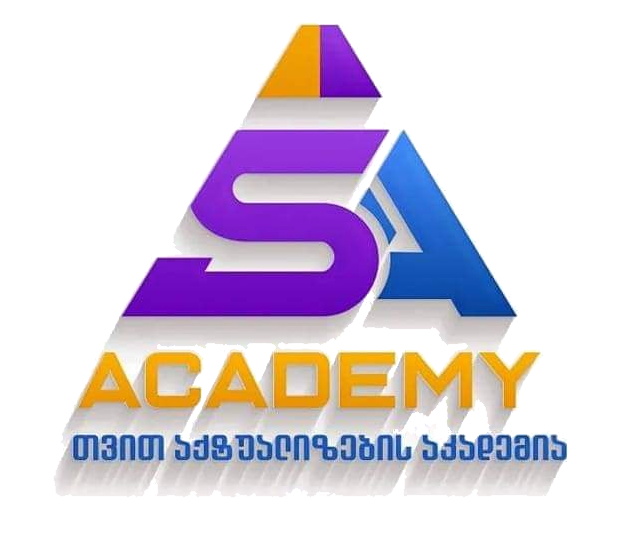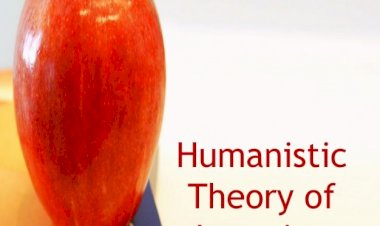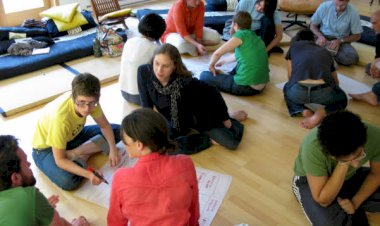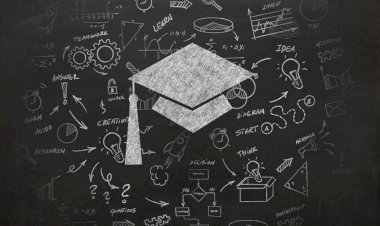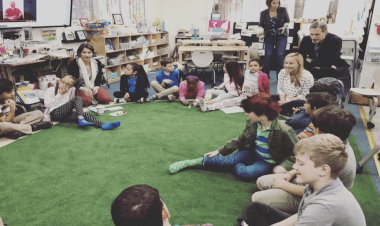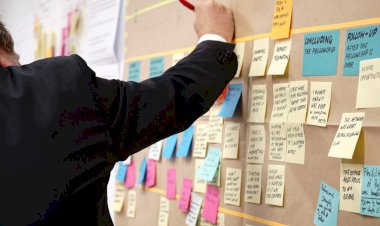Education Should Help Learners Discover and Develop Their Innate Potential and Talents
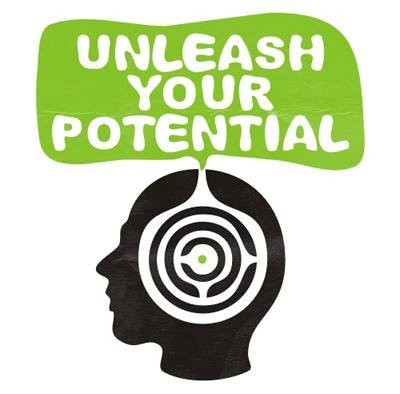
Education Should Help Learners Discover and Develop Their Innate Potential and Talents
Nana Aleksidze
2018
The world is making progress day by day because education is the only key to match the pace of its progress. People are giving preference to higher education. “It ensures the acquisition of knowledge and skills that enable individuals to increase their productivity and improve their quality of life. This increase in productivity also leads towards new sources of earning which enhances the economic growth of a country” (Saxton, 2000). As requirements are being constantly changed the demands also follow them, the contemporary society need to obtain the tool to compete in the life competition. One of the important tools for personal development is knowledge gained through education. “Knowledge is power, and power is unfortunately something that is hard to come by these days”. (Rowan, 2014).
The importance of education was actual in almost every period of our era, but in the modern, temporary reality, where the only centre is a person the most significant challenge is to find out our role in our life, our mission and potentials, intense aspiration, to form ourselves as the high humans, “fully humans” (Maslow, 1970) by the nonstop motion towards self-actualization.
Among the methods and theories of teaching, learner-centered approach still is being more and more popular, depending on learning outcomes it provides.
Human potential is immense, there is education which can help learners discover and develop their innate potential and talent. According to Abraham Herald Maslow “we tend to take for granted the blessings we already have, especially if we don’t have to work or struggle for them”. (1970). Making the person the center of the interest and tailoring the learning process accordingly becomes of high importance nowadays.
The challenges of our century put the questions of high importance toward the humans:
- Why is Education So Important in Our Life?
- Is education for everyone?
- What are the goals of education
- How can one discover and develop his/her potential?
There are several important life factors to answer these questions:
- For a happy and stable life: If you want to lead a happy life and enjoy the good things the world has to offer, you certainly need to get educated. Education is a must for a promising and secure future and a stable life. The more educated you are, the better career options you have!
- Makes you Self-dependent and confident: Education also makes you wiser so that you can make your own decisions. Education gives you the confidence to express your views and opinions. Makes you well aware of your rights, the law and your responsibilities towards the society. Hence, education is an important factor which contributes in social harmony and peace.
- Society: In fact education helps you become a useful member of the society. An educated member certainly has a greater chance to contribute to his community. Education helps you become an active member of the society and participate in the ongoing changes and developments. Education is one of the means for socialization of the younger generation. It is a continuous effort to impose on the child ways of seeing, feeling and acting which he could not have arrived at spontaneously.
- Equality: Education is a must if we want to do away with the existing differences between different social classes and genders. It opens a whole world of opportunities for the poor and maintains equality. Education also plays a major role in women empowerment, everyone is given equal opportunities.
- Self evaluation and skills of judgment: Education encompasses teaching and learning specific skills and also something less tangible but more profound: the imparting of knowledge good judgment and wisdom.
- Personal Development: “Education is about far more than the marks you receive. It’s about understanding right from wrong and having the knowledge you need to stay afloat in today’s society. It helps to develop your perspective on the world around you and pushes you to think both creatively and conceptually about many different subjects. Without education, sensory information would simply be lost. Education allows us to process the information we receive on a daily basis and make conclusions and inferences based on what we already know”.( ROWAN, 2014 )
- Individual growth: Education helps people grow as individuals by opening mind to many things that one hasn’t been exposed to before. Education helps build social skills, problem solving skills, decision making skills and creative thinking skills. Education also provides a stepping stone to the real world, offering many different courses on proper financial techniques, life planning and personal development.
- Culture: Education has as one of its fundamental goals the imparting of culture from generation to generation. Culture is a growing whole. There can be no break in the continuity of culture. The cultural elements are passed on through the agents like family, school and other associations. All societies maintain themselves through their culture.
Contemporary world emphasizes the important factors or variables which have the high influence on a person’s competent learning process. These are:
- Parent-child relationship
- Teacher-learners relationship.
- Social Factors
- Economical Factors
- Peer relationship
- Cultural /ethnical factors
- Gender
Parent-child relationship:
What we may call relationship; psychologists call it “attachment.” According to the attachment theory or the study of these relationships pointed out some of the key steps parents can take to raise their children well. Parent child relationship has influence on many factors; one of them is teaching-learning factors. From early childhood, the home becomes a school. Parents’ roles in educating young children start as early as the toddler years. Parents simultaneously educate their children while they strengthen the parent-child attachment.
The National Center on Parent, Family, and Community Engagement (NCPFCE) has created a Research to Practice Series on the Family Engagement Outcomes of the Office of Head Start (OHS) Parent, Family, and Community Engagement (PFCE) Framework. One in the series is this resource which addresses the “Positive Parent-Child Relationships” Outcome: “Beginning with the transition to parenthood, parents and families develop warm relationships that nurture their child’s learning and development.
According to NCPFCE “Head Start (HS) and Early Head Start (EHS) community” program, positive parent-child relationships provide the foundation for children’s learning. With parents’ sensitive, responsive, and predictable care, young children develop the skills they need to succeed in life. Early parent-child relationships have powerful effects on children’s emotional well-being (Dawson & Ashman, 2000), their basic coping and problem-solving abilities, and future capacity for relationships (Lerner & Castellino, 2002). Through these interactions, children learn skills they need to engage with others and to succeed in different environments (Rogoff, 2003). They learn how to manage their emotions and behaviors and establish healthy relationships with adults and peers. They also learn how to adjust to new situations and to resolve conflicts (2013)
Teacher-learners relationship:
Positive teacher-student relationships promote development of students’ learning skills and draw them into the process acquiring knowledge and promote their desire to maintain their potential. Improving students' relationships with teachers has important, positive and long-lasting implications for both students' academic and social development. Solely improving students' relationships with their teachers will not produce gains in achievement. However, those students who have close, positive and supportive relationships with their teachers will attain higher levels of achievement than those students with more conflict in their relationships. According to Sara Rimm-Kaufman a student who feels a strong personal connection to her teacher, talks with her teacher frequently, and receives more constructive guidance and praise rather than just criticism from her teacher is likely to trust her teacher more, show more engagement in learning, behave better in class and achieve at higher levels academically(2017).
Carl Rogers, as the gifted and facilitator teacher himself strongly backed the idea of a teacher as a facilitator and outlined his approach in the teacher learner relationship, according to him, the facilitator’s prizing or acceptance of the learner is an operational expression of her essential confidence and trust in the capacity of the human organism (1977)
Rogers’ approach lies in part in his focus on relationship. As he once wrote, “The facilitation of significant learning rests upon certain attitudinal qualities that exist in the personal relationship between facilitator and learner”. (1977)
Social Factors:
Education has a great social importance especially in the modern, complex industrialized societies. Philosophers of all periods, beginning with ancient stages, devoted to it a great deal of attention.
Education acts as integrative force in society by communicating value that unites different sections of society. The family may fail to provide the child the essential knowledge of the social skills and values of the wider society.
The school or the educational institutions can help the child to learn new skills and learn to interact with people of different social backgrounds.
Society and education are two inseparable elements in our world. It has always been in talks how education influences the society. Society plays a significant role in education. It can influence it both ways, positively and negatively. The values, morals, and principles of a society will create an education system that upholds the same values, morals, and principles.
Economical Factors:
The social status also dictates the kind of education people can obtain. The cost of education can be correlated with the social system that is, as you go up the social classes, so is your capability to get education. In gist, you can get the best education if you can afford it.
Conquering these inequalities is a challenge to everyone. There is no question regarding society’s influence on education but it is up to us if we will allow society to have a negative impact not just on the education system alone but also on the overall development of an individual. We have to be mindful and vigilant in correcting unlawful and unjust ways so we can slowly mold the society into becoming a good effect on education.
Peer relationship:
Although early childhood professionals have an essential role in creating positive peer relationships among the children they teach, this role is often overlooked. Harmonious peer relationships provide the basis for developing social and emotional well-being and augmenting the learning process. Early childhood learning environments should reflect a society which values interdependency and co-operation, and in which children can experience co-operative group activities that introduce and guide the development of social skills. These interactions develop social competencies in children which in turn, serve as lifelong social tools. Interpersonal relation which formulates in the transitional period from late childhood to adolescent has a great impact on the person’s cognitive state. How a person formulates self-concept, self-worth and self-efficiency is more or less depends on the kind of peer relationship one has. When the issues concern the human potential development not only person’s own self but also his attitudes towards others is to be taken into consideration.
Cultural /ethnical factors:
Education has this function of cultural transmission in all societies. Cultural tendencies impact the way children participate in education, the term culture can be problematic because it can mean different things to different people in different contexts. Ethnicity is a shared concept and culture heritage by groups of people whose commonality are transmitted from their ancestors generation by generation Culture is the unique experiences of ethnic groups using languages, symbols, beliefs, values, ideologies, and material objects to deal with real-life problems . It acts to shape family's values, thoughts, reactions and socialization goals Therefore, the styles of communication between parents and children can be quite different among various cultures, which mean what is considered to be an acceptable way of interaction in one culture could be very offensive in another cultural context. The more sensitive an issue is more attention and care is to be taken, especially if it concerns to a person and its potential development. Educational process is complex form this point of view too, as cultural factors always play a great role in the teaching process, especially in those countries having multi cultural and multi ethnical citizens.
Gender:
Gender inequality in education affects both girls and boys, and women and men, but girls and women are still more often disadvantaged. Poverty, geographical isolation, minority status, disability, early marriage and pregnancy, gender-based violence, and traditional attitudes about the status and role of women, are among the many obstacles that stand in the way of women’s and girls’ fully exercising their right to participate in, complete and benefit from education. The issue of gender inequality is one which has been publicly reverberating through society for decades. The problem of inequality in employment being one of the most pressing issues today. In order to examine this situation one must try to get to the root of the problem and must understand the sociological factors that cause women to have a much more difficult time getting the same benefits, wages, and job opportunities as their male counterparts. It is important to examine all facets of this problem, but in order to fully tackle the issue one must recognize that this inequality in the workforce is rooted in what shapes future employees and employers–education. (Rosemary Educational Institution, 2017)
Educators should make something new and something strong on the basis of that challenge which our modern era offers. The challenge of creating the new portrait of an individual by fully involvement of those individuals in the process can be effective tool in the self actualization. They should be ready reaching it, step by step with the help of education and their healthy knowledge based on the healthy and sound conceptions. The challenge called “giving free choice “ plays the greater role in this matter, this is not only the challenge but also the human right as we are free with our choices and responsibilities at some cases but we are not free with the results after making the choices.
According to Maslow, people can choose in accordance with their own taste and appetite, their character of judgment, the youngster chooses the motivation to which he will attribute the behavior accord with his generalized optimism or pessimism (1970), the below mentioned aspects play greater role in maintaining and developing innate human potential in learners and their strive for realization:
- Striving to Self-actualization within the educational channels
- Maintaining the person-centric approach in the educational process
- Maintaining sound and healthy relationship
- Assisting youngsters to find and to know well their “Own Self”
- Maintaining the self deciding ability
- Having ability to concentrate to the result
- Letting learners maintain their own healthy interpretation of life and have their own vision
- Developing the win-win strategy and reaching the synergy
To assist youngsters to achieve these goals, discover and develop their innate potential and ultimately be self actualized, psychologists should together with teachers consider not only pupils behavioral aspects but their ability and potential. According to Abraham Maslow, we can’t avoid the fact of individual differences we will have to learn to think of them in a new way (1970).
On the basis of my research project I have several recommendations:
- Education should be strongly person-centric and humanistic
- Educational process should maintain right ways to prosper the hidden potentials in every pupil.
- Educators should make the relevant environment for proper perception of the reality.
- Education should motivate pupils to ask the most important questions to them and to find the answers.
- Educators should consider the individual differences and to make the right border between common and individualism.
Theoretical Background
Education, therefore, has a supreme function in human and social development. Human life is a process of creating value, and education should guide us towards that end. Thus, educational practices should serve to promote value creation. Education’s fundamental role should be to facilitate and guide students towards the creation of value. Education as determiner of a child’s economic future and is significant to a child’s social and emotional development, their sense of identity and sense of place in the world. When the question is about the achievement of excellence, according to Mintrom, research findings on effective support for learning, the development of expertise, and the psychology of success suggest that the pursuit of excellence is teachable. (2014). Discussion-based teaching, critical thinking and social interaction in active learning have been regarded as a route to improving students’ active role. (Hajhosseini, 2016). Schools should demand active participation from parents’ side. Schools should organize training seminars or educational projects that would help parents learn more ways to assist their kids after school at home (Pipia, 2015). Aiming to satisfy student expectations is considered a virtue of corporate pedagogy where the students, as customers, are considered to be appropriate in providing the reference point for determining ‘good’ teaching (Abdelani, 2015).
Adult learners differ in many aspects: motivation to learn, responses to learning opportunities, age, their intelligence, personality type (extrovert, introvert), cognitive styles (convergent/divergent thinking), syllabus-bound and syllabus-free, the need for stimulation; they may have different approaches to learning reactions. Adults need to decide themselves what occurs for them in the learning event, also they need to see the immediate usefulness of new learning, such as skills, knowledge or attitudes they are working to acquire ( Mikeladze, 2015). According to Harris, every person should be regarded as worthy of sympathetic consideration, and should be so treated; secondly, no person should be regarded by another as a mere possession, or used as a mere instrument, or treated as a mere obstacle, to another’s satisfaction; and thirdly, that persons are not and ought never to be treated in any understanding as mere expendables (1969, p. 113). Fruitful communication across different cultures seems more and more challenging, as one set of rules or behavior is acceptable or common for one part of the world and unusual or vague for others (Kutateladze, 2015). Successful teacher training is often described as equipping beginning teachers with an array of effective student-centered strategies. Promote collaboration; entailing specific learning skills pedagogies; and encouraging students to reflect on the content of what they learn and how they learn (Confait, 2015). Teachers should continuously engage in professional development activities to improve their teaching performance. Professional development for teachers has been a substantial issue in contemporary educational research and policy ( Bovlan, 2016). Facilitating successful long-term educational change requires the support and commitment of many stakeholders, especially the teachers on the front lines of classroom implementation (Endacott, 2016). Solving word problems is a complicated and often misunderstood process. Following problem-solving processes are: (1) understanding the problem, (2) characterizing the problem, (3) representing the problem, (4) solving the problem, (5) reflecting on the solution, and (6) communicating the problem solution (Kingsdorf, 2016). Kearney develops the idea of complexity not only of education but also teaching and considers that; there is no doubt that teaching is a tough profession and one that continues to grow in complexity” (2016).
According to Self-Determination Theory, intrinsic motivation is innate. However, the maintenance and enhancement of intrinsic motivation depends upon the social and environmental conditions surrounding the individual (Riley, 2016). Murray outlines the basic pedagogical practices which are: sharing power with students, either by offering students choices about what and how they will be doing things in a course or by involving students in course design and decision-making about their own education and learning, can greatly increase student engagement and, ultimately, student success( 2016). With the rising emphasis on culture teaching and intercultural awareness, intercultural competence has been considered as an important factor of communicative competence (Monfared 2016).\
Education gives us knowledge of the world around us and changes it into something better. It develops in us a perspective of looking at life. It helps us build opinions and have points of view on things in life. Education makes us capable of interpreting things, among other things. It is not just about lessons in textbooks. It is about the lessons of life. One thing I wish I can do is, to provide education for all: no child left behind and changes the world for good (Doumbia 2013)
According to Dunlp ,one pedagogical challenge of the twenty-first century is the continually changing data literacy landscape that currently exists in today’s society, the ability to understand and use data effectively , a specific skill and knowledge base that enable educators to transform data into information and ultimately into actionable knowledge (2016).
The suggested steps for the facilitative educational process and student-centered educational management are:
- Get conscious of the educational role and its significance. Education, therefore, has a supreme function in human and social development. Human life is a process of creating value, and education should guide us towards that end. Thus, educational practices should serve to promote value creation. Education’s fundamental role should be to facilitate and guide students towards the creation of value” (Sherman, 2016).
- Get conscious of one’s potential. “Hopeful” way of human knowledge and the knowledge in itself coincides the process and perceiving of information or discovering and uncovering new or already existed old in a new way. This is called education the indispensible mean of “self growth” (Maslow, A., 1970, Locke, J., 1690).
- Every person should be regarded as worthy of sympathetic consideration, and should be so treated; secondly, no person should be regarded by another as a mere possession, or used as a mere instrument, or treated as a mere obstacle, to another’s satisfaction; and thirdly, that persons are not and ought never to be treated in any understanding as mere expendables (Harris, 1969, p. 113).
The theoretical value of the dissertation deals with the analysis and systematization of the existing theories of motivation, innate potential and self growth and their role in the education and person’s self construction.
- Gaining good communicative skills and relevant fruitful communication. Fruitful communication across different cultures seems more and more challenging, as one set of rules or behavior is acceptable or common for one part of the world and unusual or vague for others”(Kutateladze, 2015) .
- Making plans and being purposeful, being motivated and self organized: As to make distinct your plans for future and for the nearest future, to make clear your wished and goals, to draw plan and make map for reaching it. To be motivated for self growing, to be more educated, to be hard working, to point out strong points in your character and abilities to strengthen them more, to be tolerant to the innovations and to be updated always.( Mikeladze, 2015).
- Maintaining critical thinking and respect for one’s own self and for others, to get fully and well conscious of the importance of education and to respect as own self as well as others equally.
- Discussion-based teaching, critical thinking and social interaction in active learning have been regarded as a route to improving students’ active role (Hajhosseini, 2016).
- Maintaining student evaluation system as to motivate and encourage them more for gaining better and even best ultimate results. Every person should be regarded as worthy of sympathetic consideration, and should be so treated; secondly, no person should be regarded by another as a mere possession, or used as a mere instrument, or treated as a mere obstacle, to another’s satisfaction; and thirdly, that persons are not and ought never to be treated in any understanding as mere expendables. Ideals are aspects of excellence, goals that bring greater harmony on one’s self and between self and others (Harris, 1969, Shioshvili, 2015).
Practical values of the suggested steps after implementation are:
- Having more motivated students, more conscious of their abilities and more active
- Having more confident students and more mobilized and motivated teachers
- To help parents get the right information through the good program created by the competent responsible people.
- Being positively motivated , purposeful and all in action
- Making innovative activities
- Being more close to the students
- Making more acceptable and suitable environment
- Being more person centric and human
- Gaining good result through the relevant communication and motivation.
Practical steps:
- Teachers and psychologist should work together and point out the core questions and problems of the educational process
- To make plans for the better results considering not only the one sided educational process –teacher in action but very flexible broad and diverse one
- Making education more person centric( through the diverse lessons, activities, questionnaires, periodical interviews and dialogues)
- Getting more professional and trained teachers and psychologists
- Having active communication with the parents through the periodical meeting, interviews and activities
- Making positive and relevant environment for students, for teachers.
- Making periodical update and renewal for the purpose of being constantly live and vivid.
Conclusion:
Depending on all the above mentioned we can conclude that Knowledge itself means arming the person with those abilities, paradigms and approaches which develop the hidden , invisible and even buried intellects and potentials, one can more vividly and precisely see himself, others and the universe. In this matter there is no other alternative but Education, effective person-centric Education.
Person-centric education, based on the interest-based learning is nothing new. Parents, educators and kids have all known for a long time that students do better if they are interested and engaged in a topic. Now we just have to encourage schools to practice this form of teaching and our kids will benefit.
One can change everything for one’s own good by means of good and person centric education. Education which aside all the traditions and so on can give the youngster free choice of future actions and helps them create their own goals and missions. Furthermore the healthy society is the guarantee of the sound consequences as those reasonable results favor the harmonic atmosphere in the countries and in the world.
